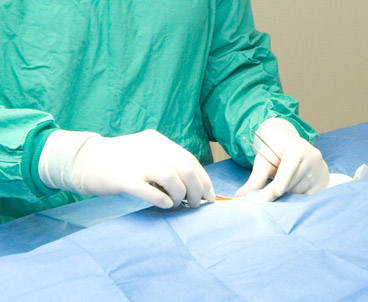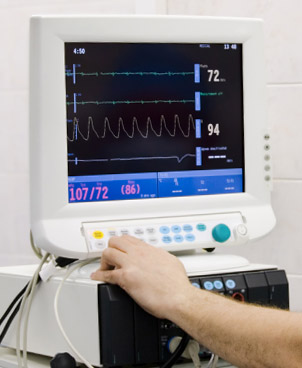Your Pet's Surgery at South Fork Animal Hospital
When your pet needs surgery, you can have confidence your veterinarian at South Fork Animal Hospital will work hard to ensure the procedure is completed according to the highest surgical standards and is as comfortable and stress-free as possible for you and your pet.
 Surgical Procedures for Your Pet
Surgical Procedures for Your Pet
Our experienced veterinarians perform many types of surgeries, including but not limited to:
|
|
We understand the decision to allow your pet to undergo surgery is never easy. That's why we're happy to answer any questions regarding your pet's surgery, as well as provide you with information on proper postoperative care. It's our goal that you feel comfortable knowing you are making the right choice for your pet.
Cryotherapy
Veterinary cryotherapy uses extreme cold to destroy abnormal or diseases tissue, bacteria and other germs. For animals, it is used primarily to treat and destroy skin tumors and growths without the need for conventional surgery. It is also used in areas of the body where regular surgery would be difficult or impossible to perform. These areas include the mouth and surrounding oral cavity as well as the anal-rectal region. Cryotherapy is also highly useful for performing surgery on geriatric and older dogs and cats for whom prolonged anesthesia would be too risky.
Once freezing has occurred, the diseased tissue dies and falls off. Most conditions respond well to a single cryosurgery treatment. In advanced or serious cases, several treatments may be necessary. The advantages of cryotherapy include limited or no general anesthesia, ease of surgery, no cutting or sutures, excellent results, and minimal complications.
 Personalized Anesthesia
Personalized Anesthesia
Ensuring the health and safety of your pet during surgery is our utmost concern and requires an anesthetic and monitoring regimen that adheres to the highest principles and ideals of quality care. We utilize a state-of-the-art monitoring and anesthesia system to ensure your pet's safety during all surgeries.
Prior to surgery, your pet will receive a thorough physical examination to identify any medical conditions that might endanger your pet's health. Because not all problems can be detected on examination, we also recommend pre-anesthetic blood testing. These tests not only give us a more complete picture of your pet's health, but also allow us to tailor an anesthetic regime that is specific for your pet.
We offer a wide variety of anesthetic protocols tailored to your individual pet's needs. We are equipped with state-of-the-art anesthetic machines that provide patients with gas anesthesia. During surgery, your pet is cared for by a well-trained and experienced veterinary technician using our monitoring system, which tracks blood pressure, heart rate, respiratory rate, body temperature and oxygen level.
Comprehensive Pain Management
We all know pain hurts, but pain also has many other detrimental effects on your pet's body. Pain slows healing, decreases activity and causes behavioral changes such as aggression, anxiety and depression. Pain can also worsen some diseases like arthritis and potentially some cancers.
As part of our commitment to keep your pet comfortable and protect the bond you both share, pain management is part of our pre-operative, intra-operative and post-operative anesthetic and medical protocols. For surgeries as well as for acute and chronic conditions we use all our available and safe resources, including local anesthetics, NSAIDs (non-steroidal medications) and oral and injectable analgesics for your pet's complete comfort.
Healing Postoperative Care
Following surgery, your pet is closely monitored and cared for by our attentive medical staff for a safe recovery. As your pet is discharged from the hospital, you will be provided detailed information on how to administer any medication and properly care for your pet after surgery. We are also available to answer any questions or concerns that arise after you return home.